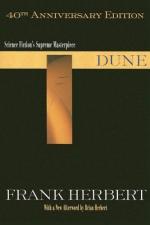|
This section contains 2,856 words (approx. 10 pages at 300 words per page) |

|
The very rawness and naivete of popular culture are signs of a vitality which can, without a breach with its origins, transcend itself in the inspiration of fine art. This fertile paradox is illustrated by Frank Herbert's Dune. It is the unstultified vigor of Herbert's imagination which is responsible for the complexity, the depth, and the symbolic virtuosity of his novel. At the same time, his art is rooted in the naive elements of good storytelling. The setting of Dune is an adventure—a wonder-land elaborately spun from the author's imagination. However, it coheres perfectly in its solidity of specification, never abandoning the concreteness and verisimilitude which are primal sources of pleasure. Dune at once captures our interest with the immediacy of its dense and vivid detail, and it intrigues us because it is strange and labyrinthine. Through his appeal to our curiosity and wonder, Herbert leads us...
|
This section contains 2,856 words (approx. 10 pages at 300 words per page) |

|


